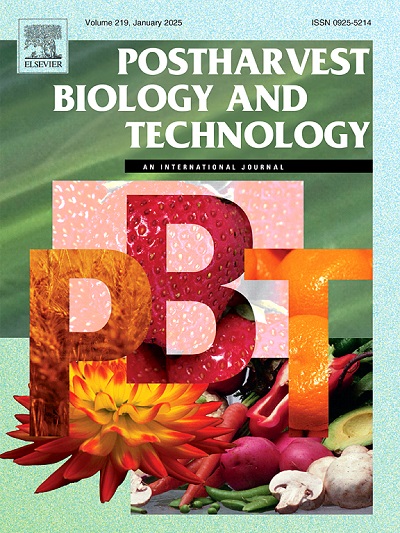Enhancing biocontrol efficacy of Cryptococcus laurentii induced by carboxymethyl cellulose: Metabolic pathways and enzyme activities insights
IF 6.4
1区 农林科学
Q1 AGRONOMY
引用次数: 0
Abstract
The synergistic biocontrol effects of Cryptococcus laurentii cultured with carboxymethyl cellulose (CMC) were studied to control Penicillium italicum in postharvest grapefruit. The results showed that C. laurentii was cultured in 0.5 % (w/v) CMC (CMC-C. laurentii) significantly inhibited elongation of germ tubes, decreased germination of conidia in P. italicum, and reduced disease in grapefruit. Besides, CMC significantly increased ATP synthase and population proliferation of C. laurentii. Moreover, metabolomics analysis revealed 24 significantly differentially metabolites in CMC-C. laurentii including the citrate cycle, metabolism of glyoxylic acid, dicarboxylic acid, phenylalanine, tyrosine, and tryptophan and amino acid biosynthesis. These results demonstrate that CMC could significantly enhance the ATP synthase by promoting the citrate cycle, providing energy for strain growth, and thereby increasing the biocontrol effectiveness of C. laurentii. Furthermore, adding CMC enhanced the activities of strain extracellular hydrolases and antioxidases, which increased the resistance to stress, thus improving the antagonistic effect of C. laurentii.
提高羧甲基纤维素诱导的月桂隐球菌的生物防治效力:代谢途径和酶活性的启示
研究了月桂隐球菌与羧甲基纤维素(CMC)的协同生物防治作用,以防治采后葡萄柚中的意大利青霉。结果表明,用 0.5 % (w/v) CMC 培养的月桂隐球菌(CMC-月桂隐球菌)能显著抑制细菌芽管的伸长,减少意大利青霉分生孢子的萌发,减轻葡萄柚的病害。此外,CMC 还能明显增加月桂球菌的 ATP 合成酶和种群增殖。此外,代谢组学分析显示,在 CMC-C. laurentii 中有 24 种代谢物存在明显差异,包括柠檬酸循环、乙醛酸、二羧酸、苯丙氨酸、酪氨酸和色氨酸的代谢以及氨基酸的生物合成。这些结果表明,CMC 可通过促进柠檬酸循环显著增强 ATP 合酶,为菌株生长提供能量,从而提高月桂褐藻的生物防治效果。此外,添加 CMC 还能提高菌株胞外水解酶和抗氧化酶的活性,增强抗逆性,从而提高月桂球菌的拮抗作用。
本文章由计算机程序翻译,如有差异,请以英文原文为准。
求助全文
约1分钟内获得全文
求助全文
来源期刊

Postharvest Biology and Technology
农林科学-农艺学
CiteScore
12.00
自引率
11.40%
发文量
309
审稿时长
38 days
期刊介绍:
The journal is devoted exclusively to the publication of original papers, review articles and frontiers articles on biological and technological postharvest research. This includes the areas of postharvest storage, treatments and underpinning mechanisms, quality evaluation, packaging, handling and distribution of fresh horticultural crops including fruit, vegetables, flowers and nuts, but excluding grains, seeds and forages.
Papers reporting novel insights from fundamental and interdisciplinary research will be particularly encouraged. These disciplines include systems biology, bioinformatics, entomology, plant physiology, plant pathology, (bio)chemistry, engineering, modelling, and technologies for nondestructive testing.
Manuscripts on fresh food crops that will be further processed after postharvest storage, or on food processes beyond refrigeration, packaging and minimal processing will not be considered.
 求助内容:
求助内容: 应助结果提醒方式:
应助结果提醒方式:


